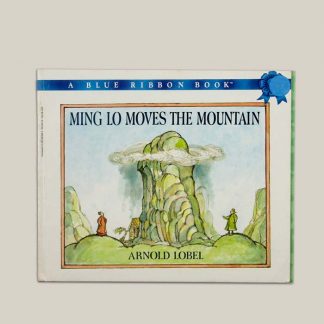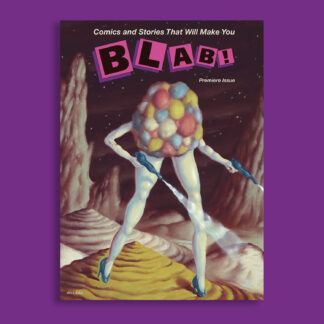The King of Circles
$22.00
by Shuntaro Tanikawa
illustrated by Kiyoshi Awazu
First published in 1971, The King of Circles is a free-spirited and imaginative collaboration between poet Shuntaro Tanikawa and graphic designer Kiyoshi Awazu. They take the reader into a colorful world where round objects compete for the title of “King of Circles.”
Betsy Bird from a Fuse 8 list of Unconventional Children’s Books: “Different round things proclaim themselves to be perfect circles… and they must therefore be the KING of circles…. But what really kicks this book up a notch is the fact that in the back the book it instructs kids to draw their own circles. It reads: “Let’s draw a circle—it’s ok if it’s a little bumpy. Let’s draw a circle—it’s ok if it’s a little crooked. Let’s draw a circle…your very own circle.” And as anyone who has ever tried to freehand a circle will tell you, this simple instruction, saying that it’s okay if your circle is bumpy or crooked, is incredibly important. Like I say. A legit great book.”
Writing about A Tiger in the Land of Dreams and The King of Circles, the legendary bookseller Japanese Avant-Garde Books said: “These are likely the coolest two children’s books published in Japan. It’s truly delightful to see these cool Japanese books being translated and enjoyed in languages other than Japanese.”
Hardcover | 24 pages | 50 Watts Books | 2023
Born in Tokyo in 1931, Shuntaro Tanikawa is a poet, translator, author, and screenwriter. During a prolific career spanning more than sixty years, Tanikawa has become one of the most well-regarded modern poets in Japan. His work has garnered praise both domestically and abroad, with his collection Floating the River in Melancholy winning the American Book Award in 1989. Tanikawa translated Mother Goose rhymes, Leo Lionni, Maurice Sendak, and Charles Schulz’s Peanuts. Tanikawa has also authored many stories for children and was nominated for the Hans Christian Andersen Award in 2008.
Kiyoshi Awazu was a self-taught graphic designer born in Tokyo in 1929. Fascinated by the intersection of Japanese tradition with modern culture, his imaginative works blended elements from Japanese woodblock prints, calligraphy and Buddhist art with bold colors and confident lines. Influenced by the works of American artist Ben Shahn, a strong political conscience is evident in Awazu’s works. The Return Our Sea poster, which won the grand prize at Nissenbi Exhibition in 1955 and cemented his position as an influential artist in post-war Japan, was created to protest the disruption to the lives of traditional fishermen caused by the American occupation of Japan. Known primarily as a graphic designer, Awazu’s curiosity and keen interest in the world around him led him to expand his colorful portfolio to painting, theater, three-dimensional works, and picture books.
In stock (can be backordered)













